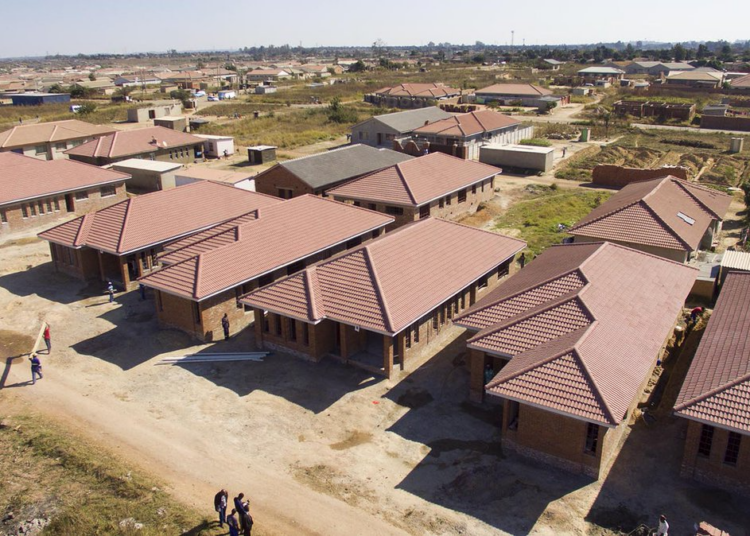A cross section of professionals in the construction business sector have expressed dismay over the worsening condition of low-cost housing scheme and Federal Housing Authority (FHA) block of flats and apartments in Lagos, while suggesting measures to put in place to address the worrisome level of dilapidated infrastructure in these low cost housing estates.
The low-cost housing which is bandied together in several blocks of flats are cited at various local government areas (LGAs) in Lagos State and they are poorly maintained by authorities and existing occupants living in the various apartments.
This development caught the attention of professionals and stakeholders in the built sector such that most of them are advocating for the renovation and urgent maintenance of Low-cost housing to stem the tide of dilapidation.
Stakeholders suggested that government needs to make bold interventions to address the poor maintenance of low-cost housing schemes and also the houses managed by the federal housing authority to ensure that proper facility management is delivered to the low-cost housing sector.
A cursory look at block of flats around Oluwole Estate (Wemco road) Ogba and federal authority housing scheme in Festac, Meiran, Agege, Isolo, Abesan estate showed dilapidated burglary rails, corroded roofing sheets, bad tanks, flooding of estate areas, faded paintings, collapsed fence, broken septic tank, poor sanitary condition, absence of security personnels and mostly non-functional street lights.
Findings by LEADERSHIP showed that the low cost housing estate and federal housing authority scheme built by the past governments to tackle housing deficit shortfall are reeking of decayed infrastructure while the occupants live in squalor and poor condition with moribund and obsolete infrastructure that can’t guarantee better livelihoods of the residents.
These low-cost houses are cited around the Central Business Districts (CBD) of Lagos where businesses and commercial activities are thriving for growth and therefore needs urgent and proper facility maintenance to fix the dilapidated structures.
Estate valuers and surveyors projected that if maintenance is not properly addressed and done, it would skyrocket the numbers of Nigerians who don’t have a roof over their heads in the near future while calling for government interventions to fix infrastructure decay of low-cost housing schemes.
The construction expert said some of the properties in the hands of federal housing authority lacks proper maintenance while stressing that, although government had sold out some of the flats to individuals and given to this, the maintenance and renovation of the block of flats can no longer be entrusted into the hands of the government.
Reacting in his submission, a facility maintenance expert, Engineer Afolabi Adedeji hinted that building of low and affordable houses is not the problem but the aftermath maintenance is key.
According to him, most of the mass houses that were built in the past had been left to ‘suffer’ due to absence of maintenance.
He was quick to add, that until the people began to take the issue of facility maintenance with the seriousness it deserve, all efforts would be an exercise in futility.
Speaking in a Media chat, former REDAN auditor, Southwest operations, and General manager of Roccio Carrillo property Investment, Mr. Emmanuel Oyelowo pointed out that, for any government, whether at the Federal or State level to embark on the construction of low or affordable housing scheme, there is need for involvement of the private sector.
According to him, private sector is the key to infrastructure development while stressing that no meaningful accomplishment can be made in that direction if the private property developers were left out in the equation.
He added that, the private property developers with their vast knowledge in this area, would be in a better position to ‘do the needful to preserve facility and infrastructure in the state.
He further said, that the Federal Government should partially hands off the provision of mass housing to private entrepreneur to handle it but with the Federal Government playing the supervisory role in order to ensure that the proper thing is done.
Oyelowo however, frowned at the pace of development in the housing sector pointing out, that the deficit in the sector ‘was too massive’ and all concerted efforts should be made at addressing this worrisome development.
He said that housing, being one of the basic necessities of man, should have been given the greatest attention by the government in order to meet with international best practices.
Commenting, the president of the Nigerian Institution of Estate Surveyors and Valuers (NIESV),Esv. Emmanuel Okas Wike, noted that, it is quite ‘unfortunate’ that the nation’s housing deficit is very huge in relation to the over 200 million population, adding that something drastic should be done in order to mitigate this anomaly.
According to him, the housing deficit which he said could be estimated to be in the region of about 19 million is something to worry about.
To him: “It is quite unfortunate, that as most developed countries of the world have been able to find a way of addressing the issue of acute housing shortage, Nigeria is still grappling with a way of constructing low and affordable housing for its citizenry.
“What we have now, is grossly inadequate and the earlier we start thinking of finding a permanent solution to this ‘hydra-headed monster, the better it will be for the people.
“My honest suggestion, is for all governments at different levels to embark on the construction affordable housing with adequate maintenance and infrastructure to strengthen economic livelihoods of citizens.”
Also speaking, the chairman of the Nigerian Institute of Architects(NIA), Lagos Stare Chapter,Arc. David Majekodunmi, opined that, the provision of low and affordable housing is key to the reduction of the country’s housing deficit but was quick to point out that it would take a very long time for the country to meet its housing needs because of the ever increasing growth of the population.
According to him, the deficit is growing by the day, hence, there is the need for all hands to be on deck if only we are desirous of closing the deficit.
He added that the economy presently cannot sustain a massive and robust construction because there are other competing needs which are also begging for attention.
Majekodunmi was, however, optimistic that, with the political will and the right attitude, the issue could be addressed within the shortest possible time.
Reacting, one of the Estate occupant who spoke on the condition of anonymity revealed that the current state of the low-cost housing is on a worrisome level, adding that, most occupant of the estate do not carry out necessary maintenance of the facility in the Low-cost housing estate.
While highlighting that many of estate occupants have left the houses to sink deep in infrastructure decay as many of the houses seems to rot away without proper maintenance, the Estate council expressed concern over the deteriorating state of public infrastructure that affects the quality of life for many citizens, adding that, the sale of blocks of flat and its privatisation to individuals in particular, has been a point of contention, as inexperienced entities were handed control, leading to operational inefficiencies of low-cost facility.
Speaking on recent development while reviewing the activities of existing owned housing schemes in Lagos, the permanent secretary in the Lagos State Ministry of Housing, Mr.Kamar Olowoshago stated that, adequate maintenance of facilities in the existing owned housing schemes is one of the key priority areas of governor Babajide Sanwo-Olu.
He said, the governor is highly interested in the well-being of the residents of the estates and would do his best in ensuring the durability of the infrastructure in the estates.
“Lagos, in its pursuit of the objectives is aimed at transforming the state on various initiatives targeted at guaranteeing a longer life span of the infrastructure in its housing schemes” Olowoshago said.
He further said :”the infrastructure which include central sewage treatment plants, water treatment plants, network of roads and drainages as well, standby generator as electricity transformer are put in place to add value to all the estates irrespective of their locations.
“Our efforts in the past three years are geared towards making Lagos a 21st Century economy and a model mega city with decent homes for all. We do not only provide homes, we deliver complimentary infrastructure that can transform the homes to livable communities.”
He affirmed that the ultimate goal is to ensure that the facilities stand the test of time so that the allotees of Low-cost housing can enjoy their investment in home ownership for a long period of years,
He revealed that qualified facility managers are being engaged to manage all the joint facilities so that they can serve the people satisfactorily.
He, however, enjoined home Owners to have a sense of ownership by taking charge of the facilities and report maintenance issues as soon as they occur.
Olowoshago also pointed out that the State Government has already commissioned 17 housing schemes with an additional five located at Odo-Onosa\ Ayandelu, Agbowa, Gbagada, Egan-Igando cluster 1 and Sangotedo Phase 2 at various stages of completion.
He further said that provision of decent housing is one of the key components of the transformation agenda of this administration particularly towards making Lagos a 21st Century Economy hence the huge attention granted to housing development by the state government.
He therefore urged all stakeholders, particularly, home owners to align with the State Government‘s initiatives by cooperating with the facility managers so that the State Government’s vision of sustainable housing can be fully achieved
We’ve got the edge. Get real-time reports, breaking scoops, and exclusive angles delivered straight to your phone. Don’t settle for stale news. Join LEADERSHIP NEWS on WhatsApp for 24/7 updates →
Join Our WhatsApp Channel











